Culinary Perspectives on Lunar New Year

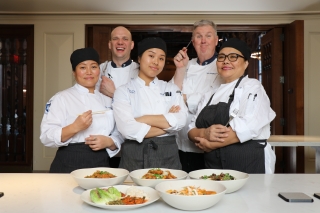
From left to right - Cook's Helper Sonam Dolma, First Cook Joshua Russo, Third Cook Sherry Chen, Chef Dave Kuzma, and Cook's Helper Lob Dolma, Photo: Christina Lee '26
新年快乐
Xīnnián kuàilè
Sherry Chen, Yale Hospitality
My favorite dish of all time is hot pot. It reminds me of family, friends, and close gatherings. Most of my family is in New York now, but whenever we are able to gather, we have hot pot for Chinese New Year, Thanksgiving, and special occasions, especially in the winter.
I love hot pot because you choose the ingredients that go into it, and my favorite ingredient is beef. I like a strong beef broth, and a numbing, spicy Szechuan flavor. The flavor takes me home to Fuzhou, China, where I lived until I was 11.
Back home, the Chinese New Year is a three-week celebration. In addition to hot pot, there’s fish, dumplings, stir fried noodles, braised chicken, pork belly, chicken feet, salmon sashimi. It’s a little bit of everything. You buy presents and visit your relatives to say, “新年快乐! - Xīnnián kuàilè!” (Happy New Year!) and恭喜发财, 红包拿来 - Gōngxǐ fācái - Hong Bao Na Lai (Please give me a red envelope!)
Now that I’m older, I’m starting to give out the red envelopes to my younger cousins.
On Friday, when you gather with friends in Commons, be sure to try the 水煮牛肉 - Shuizhu Niurou—the Szechuan boiled beef dish with seaweed, enoki mushrooms, and bean sprouts. It’s more than just a Lunarfest dish. It’s a taste of my favorite ingredients, my warmest memories, and my home.
新年快乐 - Xīnnián kuàilè!
It’s a taste of my favorite ingredients, my warmest memories, and my home.
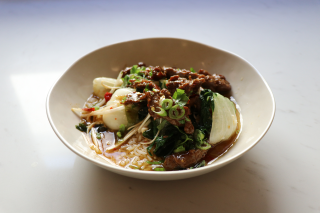
Szechuan Boiled Beef, Photo: Christina Lee '26
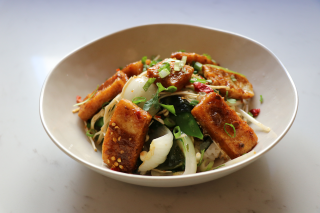
Crispy Szechuan Tofu, Photo: Christina Lee '26
ལོ་གསར་བཀྲ་ཤིས་བདེ་ལེགས།
Losar Tashi Delek
Lob Dolma, Yale Hospitality
As a Tibetan girl growing up in Bangalore, India, the Lunar New Year, or Losar, was one of the most exciting times of the year. The whole family would rise early in the morning to wish each other, “Losar Tashi Delek,” the Tibetan expression for “Happy New Year!” The day began with prayers to usher in happiness for all living things—the people, the animals.
I wasn’t from a wealthy family, but everything for Losar was somehow new—new shoes, new dresses. Our family and friends would gather, and everyone would help with the cooking. We would mix barley with ghee and dry cheese to make ngarchur, and we would make bhocha, a Tibetan butter tea. We would make khapse, a crispy new year cookie. And we would make dresil, a delicious and very special dish of steamed rice, almonds, cashews, and dried fruits.
There were hugs and well wishes, visits to the temple—such a huge temple—and gifts on the altar. My family keeps these traditions still today at our home and nearby temples in Connecticut.
This Friday, when you head to Commons for a taste of chicken tikka masala with rice and black lentil dal, know that you are getting a taste of my childhood. It’s a blessing of happiness from Tibet to India to Connecticut and, finally, to you.
ལོ་གསར་བཀྲ་ཤིས་བདེ་ལེགས། - Losar Tashi Delek!
...you are getting a taste of my childhood. It’s a blessing of happiness...
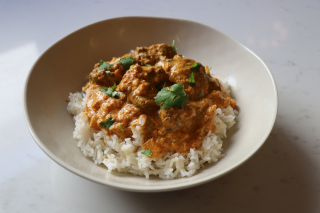
Chicken Tikka Masala, Photo: Christina Lee '26
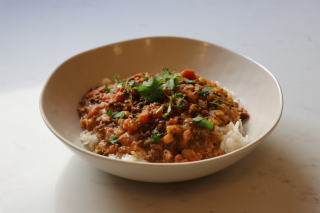
Dal Makhani, Photo: Christina Lee '26
새해 복 많이 받으세요
saehae bog manh-i bad-euseyo
Christina Lee ’26
My earliest memory of Lunar New Year was church. I grew up attending a Korean American church. One Sunday, as I was getting ready, my mom said, “Today, you have to wear your hanbok.”
Interesting, I thought.
When I arrived, all the kids were wearing hanbok. Adults were in traditional clothing, too. Games were set up, and members of the congregation had prepared Lunar New Year foods.
At home, my family made sure to call our relatives in Korea and wish them, “새해 복 많이 받으세요 - saehae bog manh-i bad-euseyo” (Happy New Year).
Church was my first realization that the Lunar New Year was a community celebration, and Yale was my second. During my freshman year, I celebrated with friends from a variety of backgrounds over a dinner of Asian food. That’s when I understood how big—how significant—Lunarfest was.
Food is an important part of any celebration. When I was growing up, my family and I would share rice cakes for the Lunar New Year. Kimchi was more of a cozy, year-round staple. Bossam, by contrast, was a dish I associated with special occasions. It was a bit more expensive, the kind of thing we’d drive to a nice Korean restaurant 40 minutes away from our house to enjoy.
Thankfully, Commons is close by and serving bossam this Friday! So, when you’re here for the Lunarfest-themed lunch, you’ll get a chance to savor both the cozy and the elegant, celebrate your story—and make new ones—with friends.
새해 복 많이 받으세요 - saehae bog manh-i bad-euseyo
...savor both the cozy and the elegant, celebrate your story—and make new ones—with friends.
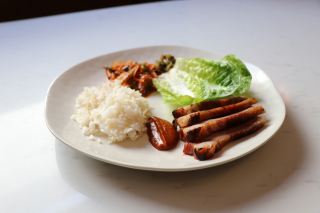
Bossam, Photo: Christina Lee '26
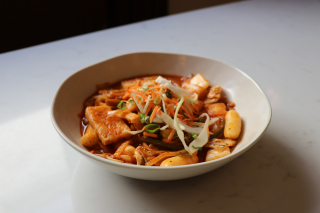
Kimchi Stew, Photo: Christina Lee '26
